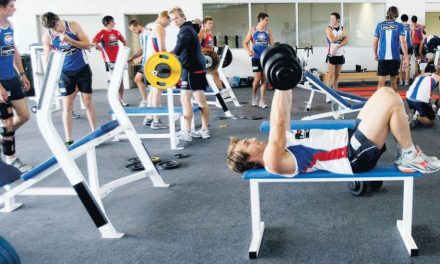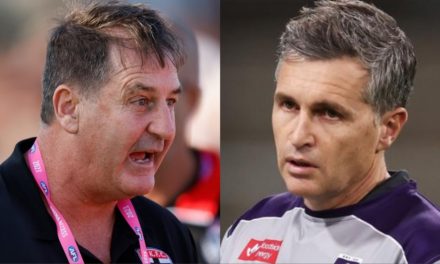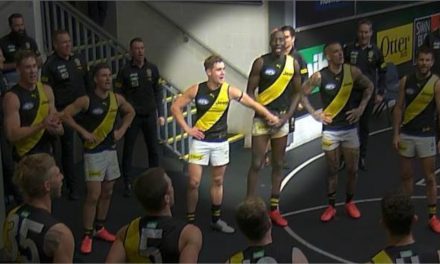Former Carlton coach Brendon Bolton leaves the press conference announcing his departure. Photo: GETTY IMAGES
The heightened AFL coaching “protectionism” which has prevailed in the wake of the late-blooming Damien Hardwick and Nathan Buckley experiences is suddenly being sorely tested.
And the emotional fallout from Carlton’s entirely rational sacking of Brendon Bolton is testament to an altered coaching landscape.
A sport long renowned for its scant regard for coaching life is now seemingly intent on living by a “patience is a virtue” mantra when it comes to its senior men.
And while this shift in philosophy could simply be a sign of more genteel contemporary times, it’s hard not to think the hard-earned Hardwick and Buckley success stories have played a significant part.
They are stories which centred on clubs sticking with struggling coaches only to reap the rewards down the track. In Hardwick’s case, Richmond’s drought-breaking 2017 premiership, and for Buckley, Collingwood’s epic 2018 grand final appearance.
The Hardwick and Buckley precedent was certainly not lost on under-fire Essendon coach, John Worsfold last week. A key plank of Worsfold’s own public defence was his “careful what you wish for” reference to the fact that many had called for Hardwick and Buckley’s heads during darker times.
Never mind that, unlike first time coaches Hardwick and Buckley during their formative struggles, Worsfold is a premiership coach with over 350 games experience in the top job.
And here’s the rub. One coaching trend doesn’t fit all. Particularly when you consider the relatively bespoke Hardwick and Buckley coaching scenarios back when times were tough.
Both enjoyed the special type of goodwill reserved for former star players. Of course, that Buckley was also a favourite son of the Pies, only sweetened his pot.
Each was fortunate to have an employer that was heavily motivated not to wield the axe.
While Richmond was intent on ending its interminable culture of bloodletting, Collingwood was loath to admit any flaw in the Eddie McGuire-orchestrated “Kirribilli agreement” which saw Buckley take over from the then-black and white messiah Mick Malthouse.
Both were dealt good hands in terms of the list prospects they inherited.
Hardwick had the dynamic quartet of Dustin Martin, Trent Cotchin, Jack Riewoldt and Alex Rance at his disposal. Buckley was able to pick the eyes out of an ageing premiership team and then effectively trade out stars like Dayne Beams for Jordan De Goey-type boom recruits.
On-field, Hardwick’s first three years of improvement were capped off by a top eight finish in season number four. Buckley’s finals appearances in years one and two of his tenure were to come in very handy during the four-year drought that followed.
And Hardwick and Buckley were better than average media performers.
This is not to downplay their considerable achievements, but rather to demonstrate that such achievements were not merely the result of waiting games.
After all, to some extent, you either have it or you don’t, no matter how long the wait.
Then consider, by way of example, the troubled trio of the departed Bolton, Worsfold and fellow struggler, St Kilda coach Alan Richardson.
Certainly, each coach has benefited from his employer’s pursuit of stability in the wake of a relatively turbulent recent past.
But only Worsfold possesses the star player aura from his West Coast days. He is also the only one to boast a (single) finals appearance during his stint with Essendon.
While the Bombers’ roster looks good on paper and the Blues have a handful of bona fide young stars, not one of the three lists is close to approaching a driverless car.
Bolton’s performance at Monday’s sacking announcement has been commended, yet it would be disingenuous to describe any of the trio as naturals in front of the camera. Worsfold and Richardson, in my view, are particularly uninspiring media performers.
Viewed through this lens, and with Bolton now gone, the Essendon and St Kilda brains trust must ask themselves if Worsfold and Richardson are worth the wait.
Key to any such determination is obviously whether someone else could do a better job and/or whether wielding the axe would provide the club with a much needed circuit breaker.
While not a sacking per se, Brad Scott’s North Melbourne exit has certainly appeared to breathe new life into Arden Street.
Speaking of Scott and bearing in mind the Blues coaching vacancy, the prospect of missing out on a preferred candidate is also a very real concern for clubs that stand pat.
Only time will tell whether the Bolton dismissal represents the first blow against this current state of relative coaching immunity.
In the meantime, the clock is ticking for those that wait.











